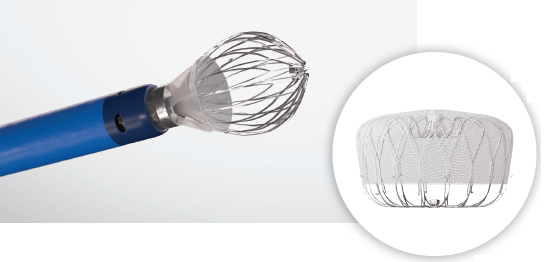
Cardiologists at Cooperman Barnabas Medical Center (CBMC) recently completed their 500th Watchman™ procedure for patients with atrial fibrillation (AFib). For those who have AFib not caused by a heart valve problem (also known as nonvalvular AFib), the Watchman device offers a safe and convenient alternative to blood thinners. The hospital first performed the procedure in 2017 and is one of only two facilities in northern New Jersey to have reached this milestone.
“Hitting this milestone is an incredible accomplishment for our cardiology team,” says David P. Dobesh, MD, an RWJBarnabas Medical Group cardiac electrophysiologist. “It’s a testament to the high level of expertise offered by our imaging and implanting cardiologists. It also demonstrates the outstanding outcomes and improved quality of life they’ve been able to achieve for patients with AFib.”
electrophysiologist. “It’s a testament to the high level of expertise offered by our imaging and implanting cardiologists. It also demonstrates the outstanding outcomes and improved quality of life they’ve been able to achieve for patients with AFib.”
Approximately 7 million Americans have AFib, a condition that affects the heart’s ability to pump blood normally, causing blood to pool in the left atrial appendage (LAA), a sac-like pocket located in the wall of the heart’s top chamber, where a blood clot may form. When a blood clot in the LAA travels to another part of the body, it can cut off the blood supply to the brain, causing a stroke.
“The average person with AFib is about five times more likely to suffer a stroke than someone with a regular heartbeat,” says Dr. Dobesh.
The Watchman, which fits into the LAA, is a small (about the size of a quarter), parachute-shaped device that is composed of a self-expanding, nickel-titanium frame with a polyester fabric cover. It is implanted through the skin and is designed to permanently close off the LAA to keep blood clots from entering the bloodstream. “The Watchman has been a game changer in how we treat AFib,” says Dr. Dobesh. “It reduces the risk of stroke without the increasing risk of bleeding from blood thinners.”
During the procedure, which takes about an hour and is performed under general anesthesia, a catheter is threaded through a blood vessel near the groin and up through the heart to the LAA. “The recovery is very quick, and most patients will be back to normal that week,” says Dr. Dobesh.
After the procedure, patients are required to remain on blood thinners for 45 days, during which time the heart will grow its own new tissue over the Watchman to create a permanent seal. A follow-up echocardiogram or CT scan will be performed to confirm that the LAA is sealed properly. The device is permanent and never needs to be replaced.
To find out more about Cardiac Services available at Cooperman Barnabas Medical Center, please call 973.322.5244 or visit www.rwjbh.org/heart.